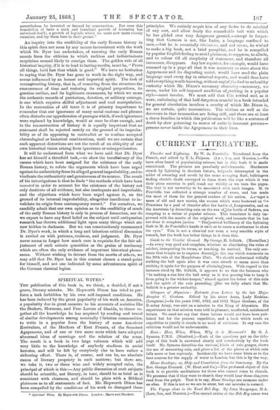SPIRITUAL WIVES.* THE publication of this book is, we think,
a decided, if not a grave, literary mistake. Mr. Hepworth Dixon has tried to per- form a task forbidden by his own self-imposed conditions. He has been induced by the great popularity of his work on America, a popularity due in great measure to his accounts of societies like the Shakers, Mormons, and Free Lovers of Oneida, to throw to- gether all the knowledge be has acquired by reading and travel of similar developments among nominally Christian communities, to write in a popular form the history of some American Revivalists, of the Iquckers of East Prussia, of the Somerset Agapemone, and of one or two more sects which have adopted abnormal ideas of marriage and the relation of the sexes. The result is a book in two large volumes which will add very little to the knowledge of anybody studious in social heresies, and will be felt by everybody else to have rather a sickening effect. There is, of course, and can be, no absolute canon of literary propriety in such matters; but there are, we take it, two or three wise and widely accepted rules, the principal of which is this :—Any public discussion of such subjects should be scientific, not literary, in tone, should be as brief as is consistent with clearness, and should be plain with a Biblical plainness as to all statements of fact. Mr. Hepworth Dixon has been compelled by the conditions of his work to disregard these
* Spiritual Wives. By Hepworth Dixon. London : Hurst and Blacken. principles. We entirely acquit him of any desire to do mischief of any sort, and allow freely the remarkable tea with which he has glided over very dangerous ground,—except in forget- ting that German is not, like Latin, a language confined to men ,—but he is essentially litterateur, and not savan, he wished to make a big book, not a brief pamphlet, and he is compelled by popular English feeling to avoid plainness, to suppress, to allude, and to colour till all simplicity of statement, and therefore all innocence, disappears. Any law reporter, for example, would have summed up in a page all that it was necessary to state about the Agapemone and its disgusting secret, would have used the plain language used every day in criminal reports, and would thus have told everything worth knowing, without any:of.the fuel to unhealthy curiosity which Mr. Dixon's necessary obscurity—necessary, we mean, under his self-imposed condition ofzwriting in a popular style—must involve. We must add that this revival and, as it were, embalming of that half-forgotten scandal iu a book intended for general circulation involves a cruelty of which Mr. Dixon is, we are certain, quite unconscious. The victims as well as the deceivers in that transaction are living still, and there are at least a dozen families in which this publication will be like a sentence of death by slow poisoning to scores of entirely innocent persons— persons never inside the Agapemone in their lives.






























 Previous page
Previous page